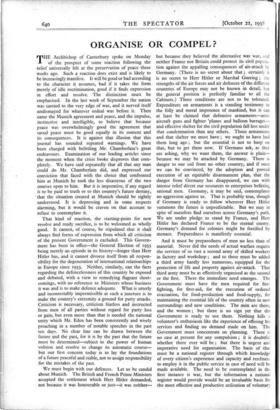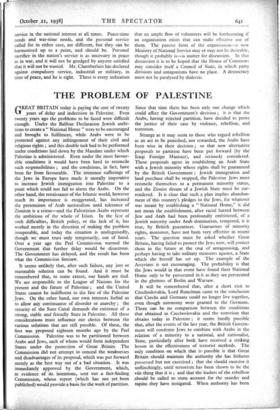ORGANISE OR COMPEL ?
THE Archbishop of Canterbury spoke on Monday of the prospect of some reaction following the relief universally felt at the preservation of peace three weeks ago. Such a reaction does exist and is likely to be increasingly manifest. It will be good or bad according to the character it assumes, bad if it takes the form merely of idle recrimination, good if it finds expression in effort and resolve. The distinction must be emphasised. In the last week of September the nation was carried to the very edge of war, and it nerved itself undismayed for whatever ordeal was before it. Then came the Munich agreement and peace, and the impulse, instinctive and intelligible, to believe that because peace was overwhelmingly good the agreement that saved peace must be good equally in its content and its consequences. It is against that illusion that this journal has sounded repeated warnings. We have been charged with belittling Mr Chamberlain's great endeavours. Examination of our leading articles since the moment when the crisis broke disproves that com- pletely. We hate said repeatedly that all that any man could do Mr. Chamberlain did, and expressed our conviction that faced with the choice that confronted him at Munich he took the less disastrous of the two courses open to him. But it is imperative, if any regard is to be paid to truth or to this country's future destiny, • that the situation created at Munich should be rightly understood. It is depressing and in some respects alarming, but it would be craven on that account to refuse to contemplate it.
That kind of reaction, the starting-point for new resolve and ready sacrifice, is to be welcomed as wholly good. It cannot, of course, be stipulated that it shall always find forms of expression from which all criticism of the present Government is excluded. This Govern- ment has been in office—the General Election of 1935 being merely an episode in its history—longer than Herr Hitler has, and it cannot divorce itself from all respon- sibility for the degeneration of international relationships in Europe since 1933. Neither, similarly, can the facts regarding the defencelessness of this country be exposed and debated, with a view to remedying flagrant short- comings, with no reference to Ministers whose business it was and is to make defence adequate. What is utterly and incontestably impermissible at such a juncture is to make the country's extremity a ground for party attacks. Criticism is necessary, criticism fearless and instructed from men of all parties"- without regard for party loss or gain, but even more than that is needed the national unity which Mr. Eden has been consistently and wisely preaching in a number of notable speeches in the past ten days. No clear line can be drawn between the future and the past, for it is by the past that the future must be determined—subject to the power of human volition and resolve to change its automatic course— but our first concern today is to lay the foundations of a future peaceful and stable, not to assign responsibility for the mistakes of the past.
We must begin with our defences. Let us be candid about Munich. The British and French Prime Ministers accepted the settlement which Herr Hitler demanded, not because it was honourable or just—it was neither— but because they believed the alternative was war, and neither France nor Britain could protect its civil popula- tion against the appalling consequences of air-attack by Germany. (There is no secret about that ; certainly it is no secret to Herr Hitler or Marshal Goering ; the strengths of the air forces and air defences of the different countries of Europe may not be known in detail, but the general position is perfectly familiar to all the Cabinets.) Those conditions are not to be tolerated. Expenditure on armaments is a standing testimony to the folly and moral impotence of mankind, but it can at least be claimed that defensive armaments—anti- aircraft guns and fighter 'planes and balloon barrages— and effective shelter for the civil population fall less under that condemnation than any others. Thaie armaments and that shelter we must have ; we ought to have had them long ago ; but the essential is not to harp on that, but to get them now. If Germans ask, as they are asking, why we want them, the answer is plain— because we may be attacked by Germany, There is danger to our soil from no other country, and if once we can be convinced, by the adoption and proved execution of an equitable disarmament plan, that the danger from Germany has disappeared, we can with intense relief divert our resources to enterprises befitting rational men. Germany, it may be said, contemplates no aggression against us. That is probably true, though if Germany is ready to follow wherever Herr Hitler summons the future is unpredictable. But we may in spite of ourselves find ourselves across Germany's path. We are under pledge to stand by France, and Herr Hitler has declared France to be the eternal enemy. Germany's demand for colonies might be fortified by menace. Preparedness is manifestly essential.
And it must be preparedness of men no less than of material. Never did the needs of actual warfare require the services of so vast a second army of skilled workers in factory and workshop ; and to these must be added a third army hardly less numerous, equipped for the protection of life and property againSt air-attack. That third army must be as effectively organised as the second or the first. There the immediate need emerges. The Government must have the men required for fire- fighting, for first-aid, for the execution of ordered evacuation, for food-production and food-supply, for maintaining the essential life of the country often in new surroundings and new conditions. The men are there, and the women ; but there is no sign yet that the Government is ready to use them. Nothing kills a volunteer's enthusiasm like the experience of offering his services and finding no deniand made On him. The Government -must concentrate on planning. There is no case at present for any compulsion ; it is doubtful whether there ever will be ; but there is urgent and imperative need for organisation. The basis of that must be A national register through which knowledge of every citizen's experience and capacity and readiness to employ it in the public service in case of need will be 'made available: The need 'to be contemplated in the first instance is war, but the information a national register would provide would 'be an invaluable basis for -the most effective' and productive utilisation of voluntary service in the national interest at all times. Peace-time needs and war-time needs, and the personal service called for in either case, are different, but they can be harmonised up to a point, and should be. Personal sacrifice in the nation's service is as necessary in peace as in war, and it will not be grudged by anyone satisfied that it will not be wasted. Mr. Chamberlain has declared against compulsory service, industrial or military, in time of peace, and he is right. There is every indication that an ample flow of volunteers will be forthcoming if an organisation exists that can make effective use of them. The precise form of the organisation—a new Ministry of National Service may or may not be desirable, though it probably is—is matter for discussion. In that discussion it is to be hoped that the House of Commons may consider itself a Council of State, in which party divisions and antagonisms have no place. A democracy must not be paralysed by dialectic.
















































 Previous page
Previous page